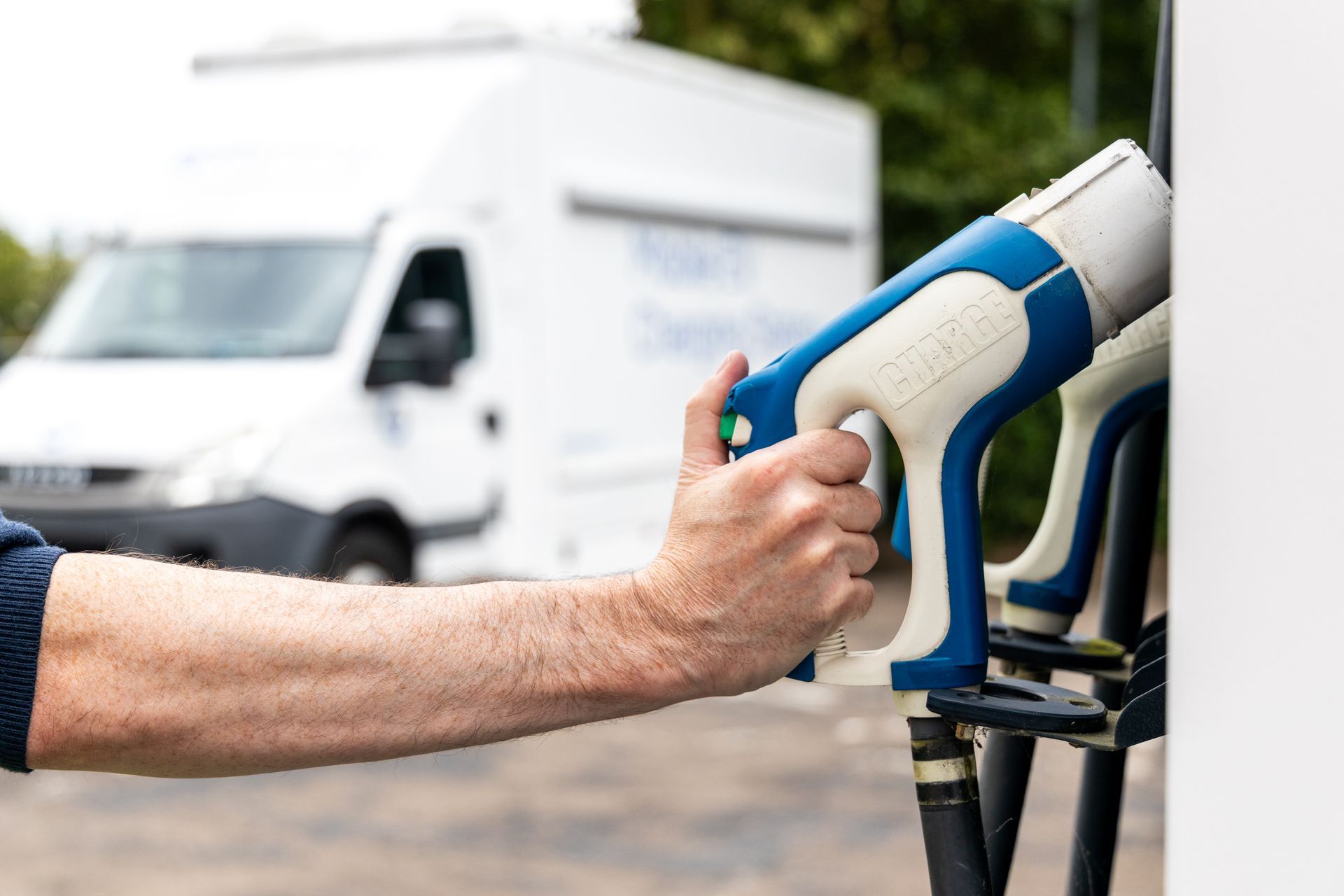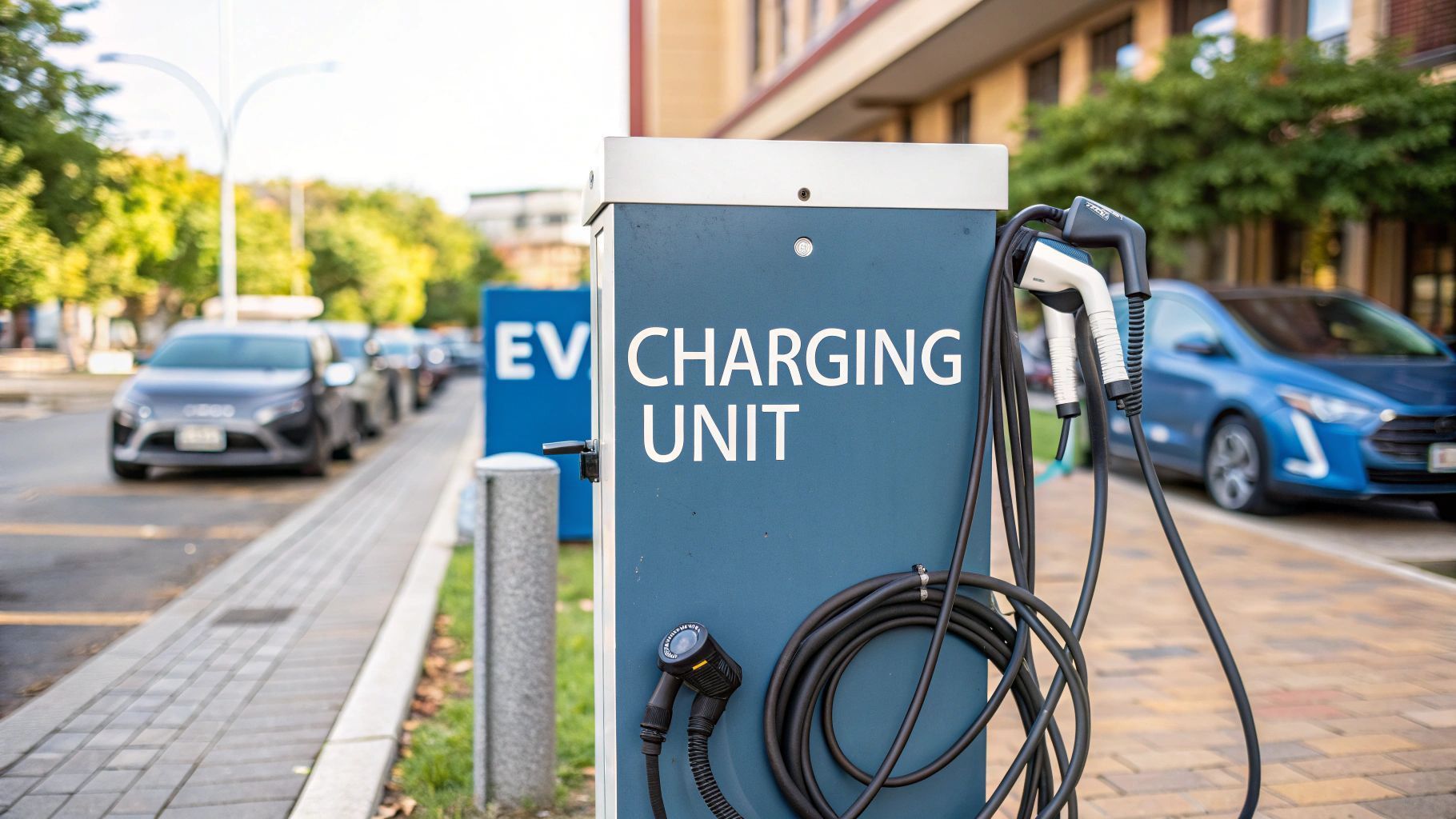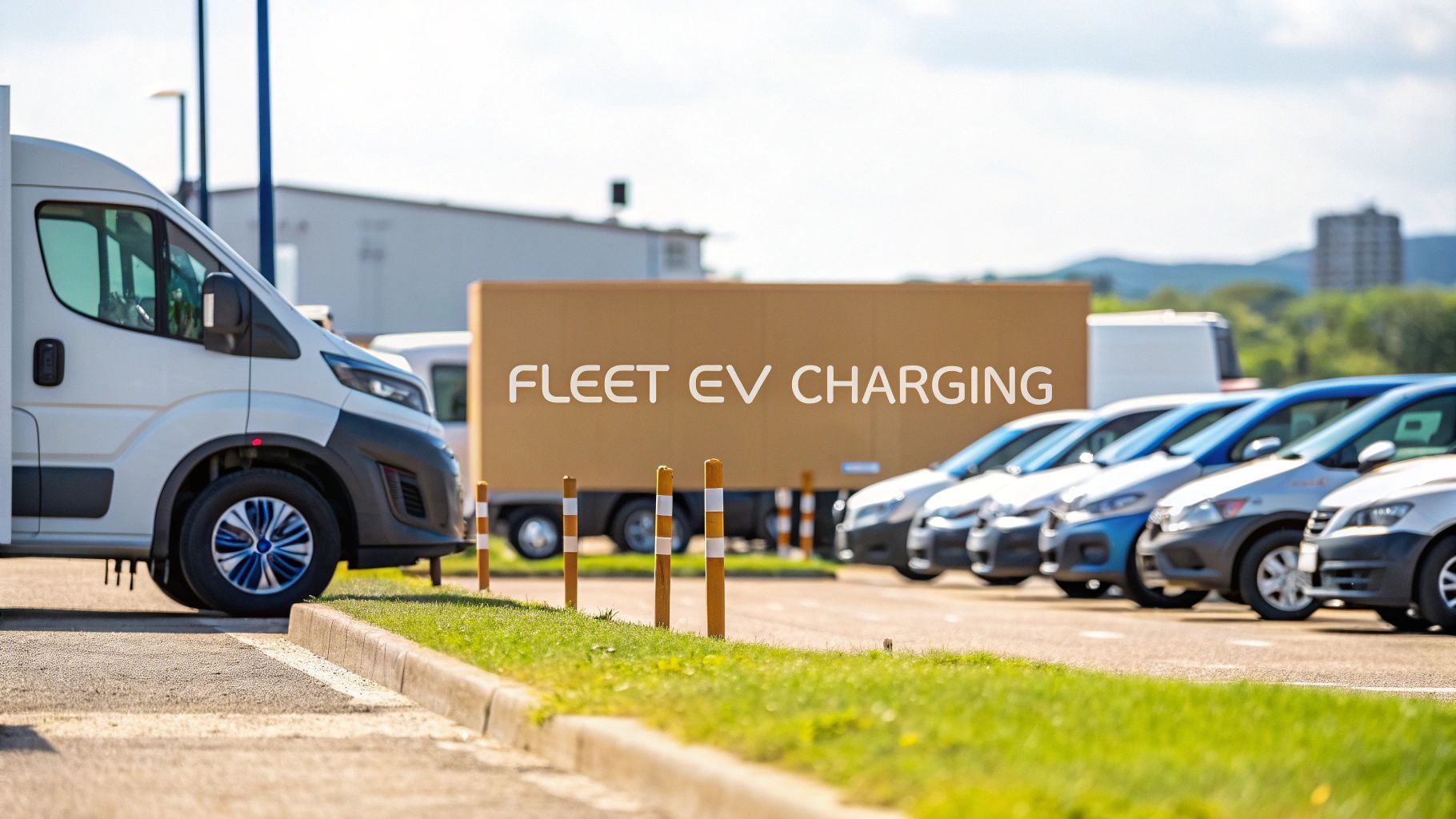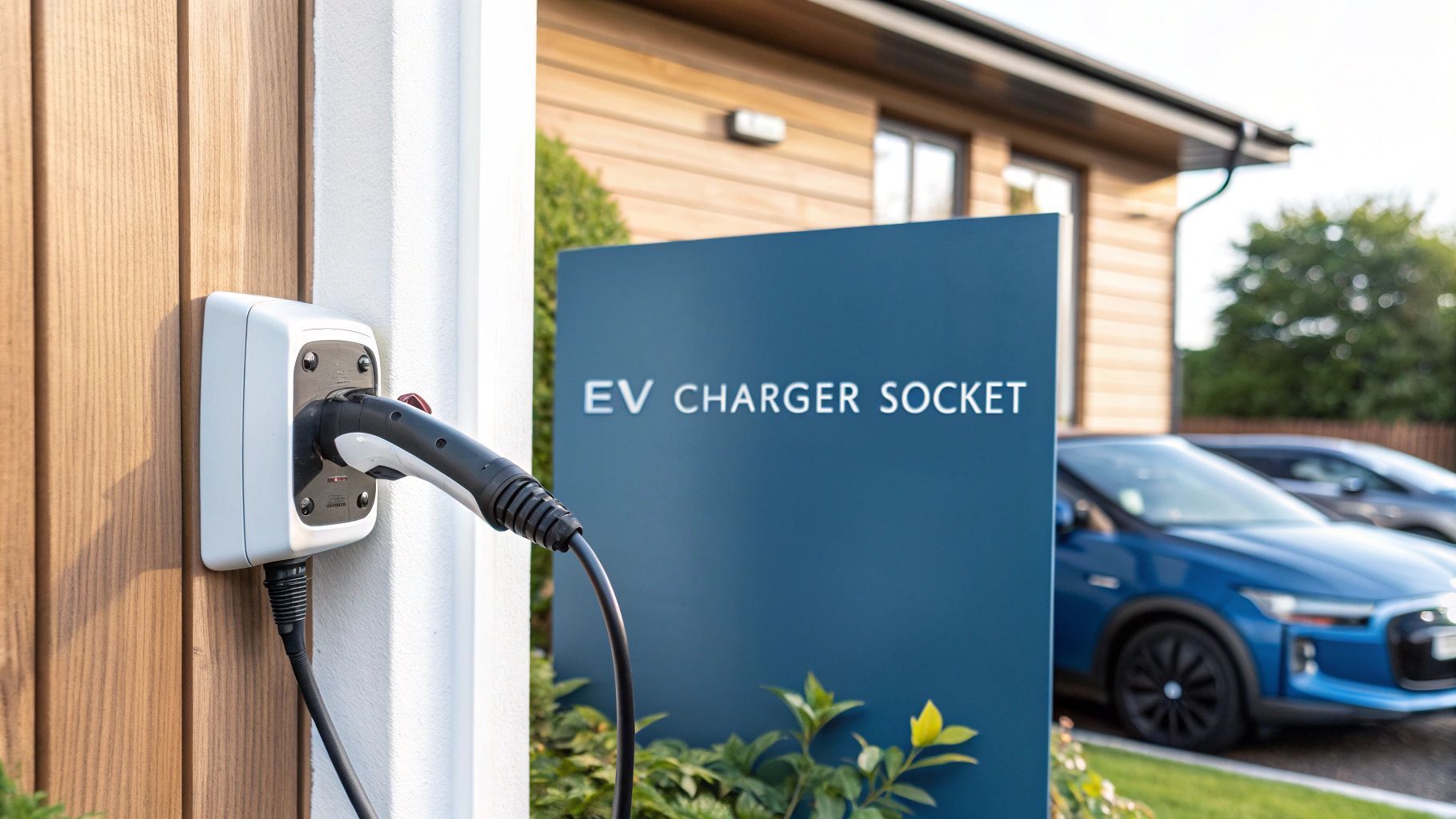Your Guide to Portable Electric Car Chargers
Imagine never having to hunt for a public charging station again. That’s the freedom a portable electric car charger gives you—an immediate, flexible power source for your electric vehicle, wherever you happen to be. It's a simple bit of kit that's quickly becoming essential for EV drivers across the UK.
The Rise of On-Demand EV Charging in the UK
The shift to electric vehicles is picking up speed all over the United Kingdom and with it comes a pressing need for more versatile charging options. While the network of fixed charging points is growing, it’s struggling to keep up, especially in rural spots or dense city centres where off-street parking is a rare luxury. This gap creates a real headache for drivers and a massive opportunity for new ideas.
A portable electric car charger slots perfectly into this gap. Don't just think of it as a backup plan but see it as your primary tool for genuine EV independence. It frees you from the ties of fixed infrastructure, letting you charge up at a friend’s house, a holiday rental, or even at work if there’s no dedicated wallbox.
Before we dive deeper, let's quickly break down the key benefits.
Key Freedoms Unlocked by Portable Chargers
| Advantage | What It Means for an EV Driver |
|---|---|
| Charge Anywhere | Any standard socket can become your personal charging point. |
| Eliminate 'Charge Anxiety' | The fear of running out of power far from a station becomes a thing of the past. |
| Total Flexibility | Perfect for travel, emergencies, or visiting places without dedicated EV infrastructure. |
| Cost-Effective | Avoids expensive public charging fees and the cost of installing a home wallbox. |
These advantages are reshaping what it means to own an EV, turning potential pain points into simple, manageable tasks.
Filling a Crucial Infrastructure Gap
The number of electric vehicles on British roads is climbing fast. As of Q1 2025, the UK had around 1.5 million electric vehicles (EVs) on the road and the government is aiming for 7 million by 2030 . That kind of growth demands a huge expansion of charging infrastructure and portable chargers are stepping in as a vital, flexible solution. You can read more about the UK's EV charging market analysis to see the full picture.
This explosion in EV numbers brings "charge anxiety"—that nagging fear of your battery dying miles from a compatible charger—into sharp focus. A portable charger is the perfect antidote. It’s the modern-day equivalent of a jerry can for the electric age, offering peace of mind to individual drivers and a reliable fallback for fleet managers.
For the modern EV driver, a portable charger is more than just a piece of equipment; it is a declaration of freedom. It transforms any suitable power socket into a personal refuelling station, ensuring you are always in control of your journey.
A New Commercial Opportunity
Beyond personal convenience, the portable electric car charger is also the cornerstone of a new and exciting business model. Entrepreneurs can now launch mobile charging services with very little overhead, offering on-demand power to stranded drivers or scheduled top-ups for people living in flats without their own charge points.
This is creating a new wave of small businesses that are agile, responsive and perfectly suited to the needs of a modern, electric-powered society. By providing a service that people genuinely need, operators can build a profitable venture, one charge at a time, generating significant revenue.
How Portable EV Chargers Actually Work
It helps to think of a portable electric car charger as much more than just a cable. Imagine a smart, heavy-duty extension lead but one that’s been purpose-built with all the intelligence and safety features needed to power up an electric vehicle. It’s a completely self-contained system, engineered for reliability and simplicity wherever you can find a socket.
At its core, the device has three main parts working together. First, you have the durable, weather-resistant cable, which is built to handle the knocks of daily use in all sorts of conditions. Then there’s the standard Type 2 connector – this is the universal plug for pretty much every electric car sold in the UK and Europe, so you know it’s going to be compatible.
Finally and most importantly, you have the intelligent control box. This is the real brain of the operation. It manages the flow of electricity from the mains supply to your car's battery, making sure everything is done safely and efficiently.
Understanding Power Levels and Charging Speed
Not all portable chargers are created equal when it comes to speed. Their power output is measured in kilowatts (kW) and this number directly tells you how quickly your car’s battery will be topped up. Most portable units you’ll find operate somewhere between 3kW and 7kW .
To get a real feel for what this means, think of charging your car like filling a swimming pool.
- 3kW Charging: This is like using a standard garden hose. It’s steady and it gets the job done but it’s going to take a while to fill the whole pool. It’s absolutely perfect for overnight top-ups at home or when you’re not in a hurry.
- 7kW Charging: Now, this is more like using a fire hose. It delivers more than double the power of a 3kW unit, seriously cutting down the time it takes to add a meaningful amount of range. This kind of speed is ideal for faster top-ups or for commercial mobile charging services where time is money.
Getting your head around this difference is key to managing your time and charging needs. If you’re interested in the nuts and bolts, you can learn more about how to calculate a kilowatt-hour and what it means for your charging times.
This infographic paints a clear picture of how portable chargers connect the growing EV market with new opportunities for both driver freedom and business ventures.
As you can see, the device sits right in the middle of these three interconnected areas, showing just how vital its role is in modern electric mobility.
The Built-in Safety Guardian
A question we hear a lot is whether using a portable electric car charger is as safe as a proper wallbox installed at your home. The answer is a definite yes and it’s all thanks to the multiple layers of protection built right into that control box. Think of it as a vigilant guardian, constantly watching over the charging session to protect you, your car and your property.
These safety features aren’t just nice-to-haves; they are absolutely fundamental to the charger's design.
The control box is essentially a sophisticated safety computer that's in constant communication with your vehicle. It verifies the connection is secure, checks for any electrical faults and manages the power delivery second-by-second to prevent any potential issues before they can happen.
Some of the key safety features you’ll find include:
- Overcurrent Protection: Instantly cuts the power if it detects an electrical surge, protecting your car's sensitive battery management system.
- Temperature Sensors: Keeps an eye on the temperature of both the plug and the control box. If it senses things are getting a bit too warm, it will automatically slow down the charging speed or shut down completely until everything cools to a safe level.
- Earth Fault Detection: Makes sure the charger is properly grounded before a single watt of power flows, preventing any risk of electric shock.
These integrated systems all work in concert to make the portable electric car charger a remarkably safe and dependable tool. Whether you're using it for your own convenience or as the backbone of a mobile charging business, you can trust that every charge is managed with the highest degree of safety. This built-in intelligence is what elevates it from a simple cable into an essential piece of modern EV kit.
The Mobile Charging Business Opportunity
A portable electric car charger isn't just about topping up your own battery; for the savvy entrepreneur, it's the key that unlocks a serious business opportunity. With one piece of professional-grade equipment, you can build an entire mobile charging service from the ground up. This isn't just about convenience anymore—it's a profitable commercial venture with surprisingly low overheads that can generate a substantial income.
Armed with just a vehicle and a powerful portable unit, an operator can tap into several lucrative revenue streams. The UK's EV fleet is growing by the day, creating a ready-made market of drivers who need power delivered right where they are. It's a business landscape ripe for entry.
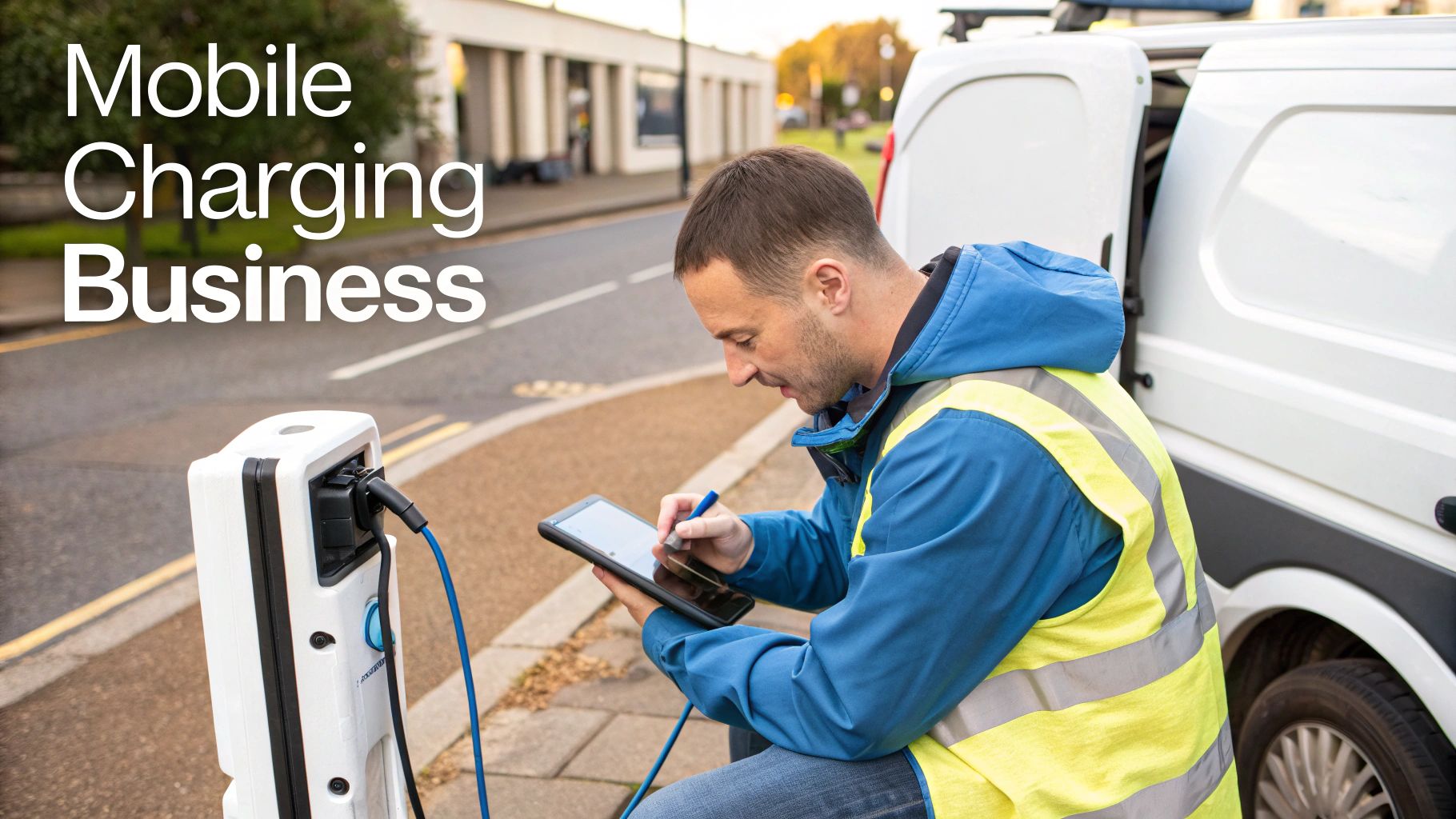
This model completely sidesteps the eye-watering costs of installing fixed charging stations. Forget about the tens of thousands needed for land, grid connections and hardware. A mobile service is nimble, scalable and can be launched for a fraction of that initial outlay.
High-Margin Emergency Call-Outs
The most immediate and profitable service you can offer is the emergency call-out. Every EV driver has a nagging fear of seeing their battery hit zero, miles from the nearest charge point. In that moment, a mobile charging service becomes an essential emergency response, just like traditional roadside assistance.
Because these situations are urgent, customers are more than willing to pay a premium for a quick fix that gets them moving again. In just 20-30 minutes , an operator can provide enough juice to get a stranded driver to the nearest public charger or even all the way home, commanding high fees for delivering that peace of mind.
And it’s not just for roadside breakdowns. Think of the drivers who misjudge their range and get stuck at the supermarket, an office car park or even on their own street without enough power to reach a charger. They're all potential customers.
Scheduled Charging for Underserved Residents
There's a huge, often-ignored market out there: EV owners living in flats, apartments or terraced houses with no off-street parking. For them, installing a home wallbox is simply not an option. This leaves them completely at the mercy of the public charging network, which can be expensive, unreliable and inconvenient.
A mobile charging operator can step in with a subscription or pay-as-you-go scheduled service. Imagine visiting a customer's car at a pre-arranged time—maybe once a week overnight or during the day while they're at work—to give it a full or partial charge.
A scheduled charging service delivers the consistency and convenience of home charging to those who can't install their own equipment. It solves a massive headache for a large slice of the EV community while building a reliable, recurring revenue stream for the operator.
This approach creates a stable client base and predictable income, perfectly balancing the more sporadic nature of emergency call-outs. Smart operators can even build efficient routes to service multiple customers in the same neighbourhood, boosting profitability. If you're thinking about this model, our in-depth UK mobile EV charging service guide is a great place to start.
On-Site Power for Events and Workplaces
Another brilliant revenue stream is providing temporary, on-site charging wherever it's needed. This service is incredibly valuable for a whole range of clients who need to offer EV charging but don't have the permanent infrastructure.
Key target markets include:
- Workplaces and Business Parks: Companies can offer EV charging as a fantastic employee perk or for their own electric fleets, all without the expense and hassle of installing fixed points.
- Hotels and Hospitality Venues: Offering on-demand charging can be a powerful way to stand out. It aligns perfectly with the guest-centric focus highlighted by emerging hospitality technology trends.
- Events and Festivals: From music festivals to county shows, large public gatherings can offer mobile charging to attendees, providing a vital service and creating an extra revenue opportunity.
- Car Dealerships: Dealerships can use a mobile service to keep their EV stock charged and ready for test drives, without cluttering their forecourts with permanent chargers.
A Realistic Look at Potential Earnings
The real magic of a mobile charging business lies in blending these different services. By combining high-margin emergency jobs with steady, contracted work, an operator can build a robust and financially rewarding venture.
So, what could a typical week look like for a single operator? The table below gives a hypothetical but realistic breakdown of the revenue potential here in the UK.
Sample Weekly Earnings for a Mobile Charge Operator
| Service Type | Jobs per Week | Average Price per Job (£) | Weekly Revenue (£) |
|---|---|---|---|
| Emergency Call-Outs | 5 | £95 | £475 |
| Scheduled Residential Charging | 15 | £40 | £600 |
| Workplace/Fleet Top-Ups | 3 | £75 | £225 |
| Total | 23 | - | £1,300 |
As you can see, this sample week brings in a potential revenue of £1,300 . That translates to over £5,000 a month before accounting for electricity and fuel costs, clearly showing the strong financial viability of this business model.
The Power of Scalability
Perhaps the most compelling part of running a mobile charging business is how easily it can grow. An entrepreneur can start small with a single vehicle and one portable electric car charger , keeping the initial investment and risk to an absolute minimum.
As the client base grows and demand picks up, expanding the business is straightforward. Adding a second vehicle and charger effectively doubles your earning potential but without the massive cost increases you'd face when trying to build out a network of fixed charge points. It’s a lean, scalable approach that lets your business grow organically, right alongside its success.
Choosing the Right Mobile Charging System
When your entire business depends on your equipment, picking the right tool for the job isn't just a preference—it's a critical decision. Let's be clear: not all portable chargers are created equal. A consumer-grade device you might keep in your boot for a rare emergency is a world away from a professional system engineered for the daily grind of commercial fieldwork.
This is where the distinction becomes crucial. As a business operator, you need far more than just a cable and a plug. You need a robust, reliable and efficient system that can handle constant use, deliver power fast and slot right into your daily workflow. Skimping on the hardware might save you a few quid upfront but it's a false economy that will almost certainly lead to lost revenue from breakdowns, slow service and unhappy customers.

Engineered for Commercial Demands
A professional mobile charging system like ZAPME is built from the ground up with the operator in mind. The differences are obvious in every component, from the battery technology inside to the casing that protects it. These systems are designed to be completely self-sufficient, providing off-grid power without ever needing to be plugged into the mains.
This is all thanks to its powerful internal battery. Think of it less like a simple charger and more like a mobile power bank for cars. It allows an operator to deliver a substantial charge to a customer's vehicle literally anywhere—from a remote roadside lay-by to a city-centre car park—completely independent of the National Grid.
A purpose-built commercial system is an investment in reliability. It’s the difference between hoping your equipment works and knowing it will, allowing you to build a business reputation based on dependability and speed.
This off-grid capability is the cornerstone of a mobile charging business. It means you can serve any customer in any location, turning your vehicle into a true mobile power station.
High-Speed Charging and Robust Design
In the world of on-demand service, time is money. A commercial portable electric car charger has to deliver power quickly to maximise the number of jobs you can complete in a day. The ZAPME system provides high-speed charging capabilities that can add significant range to an EV in a surprisingly short amount of time, getting stranded drivers back on their way much faster.
This speed translates directly into business benefits. Faster service means happier customers—the kind who leave positive reviews and recommend you to others. It also means you can fit more appointments into your schedule, directly boosting your daily revenue.
Of course, this performance is housed within a durable design built for the realities of daily fieldwork.
- Weather-Resistant Casing: The unit is protected against rain, dust and temperature swings, ensuring it works reliably in the famously unpredictable British weather.
- Rugged Construction: It’s built to withstand the bumps, knocks and vibrations that come with being transported in a van day in, day out.
- User-Friendly Interface: The system is designed for simplicity, with clear indicators and one-button operation to make it easy to use, even when you're under pressure.
These features make sure the charger isn't a fragile piece of tech but a dependable workhorse you can count on.
A Complete Business Ecosystem
A powerful tool is only one part of the equation. To run a successful mobile charging business, you also need a system for managing your operations. ZAPME provides a complete business ecosystem that turns the hardware into a turnkey business solution. This includes integrated software designed to handle the admin, freeing you up to focus on what you do best: serving customers.
The software platform helps you manage bookings, schedule jobs, process payments and track your earnings, all in one place. This integration is what elevates a simple charger into a comprehensive business asset. It removes the guesswork and administrative headaches, giving you a clear path to building and scaling your operation. By combining top-tier hardware with smart software, operators are equipped with everything they need to launch and grow a successful venture in the EV charging market.
To see the technical specifications and features, you can explore the range of ZAPME mobile chargers designed specifically for commercial operators.
Navigating the UK EV Charging Landscape
While the UK’s public charging network is growing at an incredible rate, it’s still far from perfect. This reality creates some very real challenges for electric vehicle drivers and it highlights exactly why a portable electric car charger is becoming such an essential tool for both individuals and businesses.
The infrastructure is certainly getting better but its patchy distribution leaves big gaps—gaps that mobile solutions are perfectly designed to fill.
One of the biggest hurdles for drivers is 'charge anxiety', that nagging fear of running out of power miles from the nearest working charge point. A mobile charging service acts as the ultimate safety net, turning a potential disaster into a minor inconvenience. It’s an on-demand service that delivers not just electricity but priceless peace of mind.
Servicing Underserved Communities
If you look at a map of public chargers across the UK, you’ll see it’s noticeably uneven. Big cities and motorway service stations are increasingly well-catered for but many rural areas and older urban neighbourhoods have been left behind. These ‘charging deserts’ create a genuine barrier to EV adoption for anyone living without a reliable local option.
A mobile charging operator isn’t tied to this fixed infrastructure. They can drive directly to customers in these underserved communities, providing a vital service that bridges the gap.
- Rural Villages: Operators can offer scheduled top-ups for residents who might otherwise face a long round trip just to find a rapid charger.
- Terraced Housing: For people living in older homes without driveways or dedicated parking, a mobile service is often the only practical way to get the convenience of home charging.
- New Developments: It’s surprising but even brand-new housing estates are often built without enough charging points, leaving the first residents in a tricky spot.
This flexibility allows a mobile business to build a loyal customer base in areas the big charging networks haven't reached yet. It’s a model that supports wider EV adoption by making it a real possibility for everyone, no matter their postcode.
The true value of a mobile charging service lies in its ability to deliver power precisely where it is needed most. It democratises access to EV charging, breaking down the geographical barriers that still hold many potential drivers back.
Balancing the National Grid
Beyond helping individual drivers, portable charging also plays a subtle but important role in supporting the UK's national energy infrastructure. The massive growth of EVs is putting more and more demand on the National Grid, especially during those peak evening hours when everyone gets home and plugs in their car.
By October 2025, there were over 86,000 electric vehicle charging points across more than 43,000 UK locations —a huge jump from previous years. Yet even with this rapid expansion, a portable electric car charger remains a crucial tool, offering flexibility where the fixed network can’t. You can find more insights in the UK's charging infrastructure statistics on GOV.UK.
Mobile charging helps take some of that strain off. By enabling off-grid charging powered by their own internal batteries, commercial systems like ZAPME don’t add to that peak grid demand. They offer a smart, sustainable way to top up vehicles without needing new, high-power installations that would place even more stress on local substations.
This makes mobile charging a valuable part of the UK's electric future—a flexible solution that complements the fixed network while supporting a more balanced and resilient energy system for all.
Your Next Step in the EV Revolution
We’ve covered the tech and the massive business opportunity and it all boils down to one thing: the portable electric car charger is a game-changer, playing two powerful roles at once.
For the driver, it’s the end of range anxiety. Simple as that. It’s the key to genuine freedom, turning any kerbside, car park or remote spot into a potential charge point. This bit of kit puts you back in control of your journey, freeing you from the lottery of finding a working public charger.
For the aspiring entrepreneur, that very same device is a surprisingly straightforward entry into one of the UK’s most exciting markets. The explosion in EV ownership has created an undeniable need for power on the go. A professional-grade mobile charger is the core tool for building a low-risk, high-margin business from the ground up, capable of generating an impressive income.
Empowering Your EV Journey
A professional system like ZAPME gives you a clear and proven route to getting started. It’s not just about a piece of hardware; it’s a complete business-in-a-box, combining a robust, reliable charger with the software needed to run a mobile charging service smoothly.
The portable electric car charger is more than just an accessory; it's a catalyst. It gives drivers total convenience and equips entrepreneurs to build the flexible charging network of tomorrow.
Whether you’re looking to make your own EV life easier or launch a new venture, this technology puts you right at the heart of the UK's shift to electric. It’s time to think about how it can power your next move.
Frequently Asked Questions
Thinking about portable EV chargers or even starting a mobile charging business? You've come to the right place. Here are answers to some of the most common questions we hear, explained in plain English.
How Much Can I Realistically Earn Per Month?
It really depends on your location and how many hours you put in but many operators find themselves earning between £2,000 and £5,000 per month . Success comes from building a good mix of services.
Emergency call-outs, for instance, naturally command higher fees because of their urgency. On the other hand, scheduled contract work with local businesses provides a steady, reliable income stream. Building a solid local reputation is the key to unlocking consistent business and hitting those higher earning figures.
Is a Portable Charger Powerful Enough for All Electric Cars?
Absolutely. A quality portable unit equipped with a Type 2 connector —the universal standard for AC charging—is compatible with every single electric car and plug-in hybrid sold across the UK and Europe.
Sure, it won’t match the speed of a massive 150kW rapid charger you see at a service station but that’s not its job. It delivers a very useful amount of range in a short time, which is more than enough for an emergency rescue or a convenient overnight top-up.
A professional mobile charger isn't trying to be the fastest public charger. It's designed to deliver a practical, valuable amount of power exactly when and where a driver needs it most.
What Is the Main Difference Between Portable and Fixed Chargers?
In a word: freedom. A fixed wallbox is permanently bolted to a wall in one location, like a garage, and it’s great for that daily home charging routine, often offering slightly faster speeds.
A portable electric car charger, however, can be used anywhere you can find a suitable power source. This makes it a lifesaver for renters, people without off-street parking or simply as a reliable backup. For a mobile charging business, this flexibility isn't just a feature; it's the entire foundation of the service.
Do I Need Special Wiring to Use a Portable Charger?
For personal use, you can often get by without it. At lower power levels of around 3kW, many portable chargers will work safely from a standard, heavy-duty 13A UK plug socket, as long as the building’s wiring is up to scratch.
However, for faster charging or the demands of a commercial operation, using a dedicated industrial socket (like a Commando socket) is a must. It guarantees maximum safety and performance, letting you deliver a quicker, more professional service to your customers. It's a small upgrade that makes a huge difference in a professional setting.
Ready to join the EV movement, either as a driver or an entrepreneur? Discover the professional-grade mobile charging solutions from ZAPME and see how our technology can power your journey. Explore our systems at https://www.zapme.biz.

